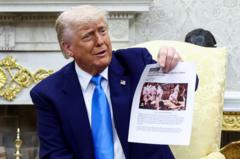In a striking display of contrasting diplomatic styles, South Africa's President Cyril Ramaphosa faced an unexpected challenge during his meeting with U.S. President Donald Trump. Just three months into Trump's second term, foreign leaders are learning that visits to the Oval Office can come with public confrontations, as demonstrated by the recent encounter in which Trump directed an extraordinary series of accusations at Ramaphosa.
The meeting, originally intended for discussions on trade and mutual interests, quickly pivoted when Trump was prompted about claims regarding "white genocide" in South Africa. Ramaphosa responded by emphasizing the need for Trump to "listen to the voices of South Africans." What followed was an intense portrayal of alleged persecution faced by white Afrikaners, revealed through a dimmed-video presentation orchestrated by Trump himself, who summoned crowds of journalists to witness the display.
While Trump presented footage of political figures engaging in fiery rhetoric—much criticized for its inflammatory nature—President Ramaphosa stood resilient, refraining from getting drawn into the combative exchanges. Even as Trump repeatedly referred to the plight of agricultural farmers in South Africa, Ramaphosa tactfully redirected the conversation, countering that if there were genuine threats to the Afrikaners, the golfers accompanying him would not have been present.
In a tactical move, Ramaphosa had brought notable South African golfers, Ernie Els and Retief Goosen, into the fold. This strategic alignment appeared to serve as a diplomatic buffer, drawing attention away from the mounting provocations of the U.S. president. While both golfers received considerable attention, Ramaphosa strategically limited his responses to fortified and calm interjections.
Though Trump’s intention appeared to bolster his domestic political agenda with his base, Ramaphosa's composed demeanor proved effective in shielding South Africa from the emotional highs encouraged by Trump’s rhetoric. Understanding the need to navigate this unusual form of diplomacy, Ramaphosa's successful balancing act highlights the ever-evolving nature of international relations amid the disruptions of populism and polarized politics.
The meeting ultimately left room for reflection on the fragility of narrative and the essentiality of dialogue versus confrontation, inviting leaders from around the world to think critically about how they approach discussions with polarizing figures.





















